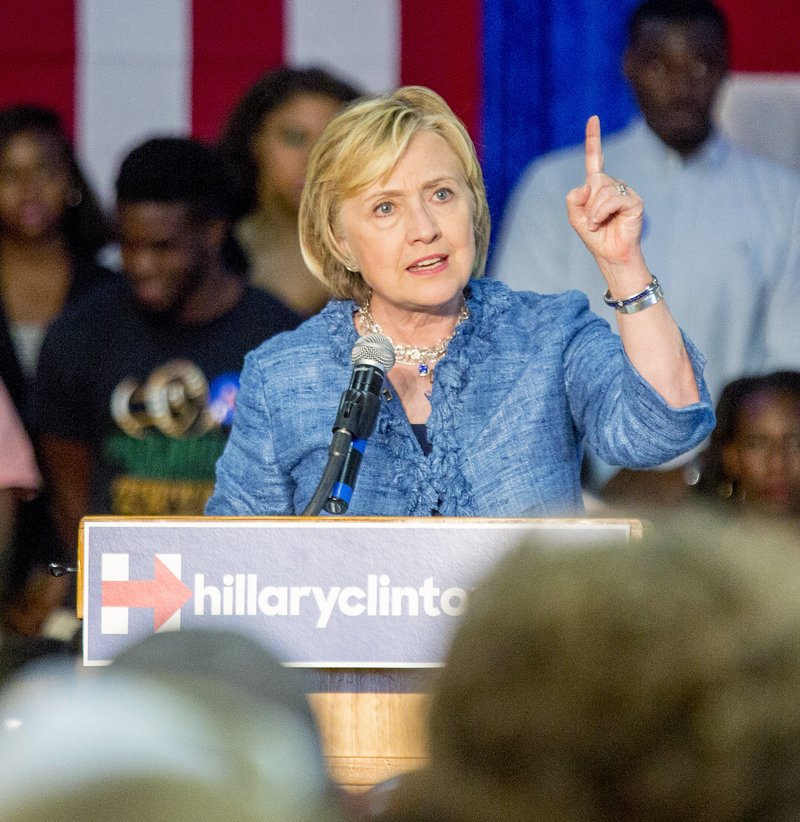DES MOINES, Iowa -- Hillary Rodham Clinton on Tuesday announced her stances on two campaign issues, outlining her plan to stem rising prescription drug costs and stating her opposition to the Keystone XL pipeline.
The Democratic presidential candidate said at a forum in Iowa that she wants to protect health care consumers while promoting innovation and putting an end to profiteering in the pharmaceutical industry.
Her plan would place a monthly cap of $250 on covered out-of-pocket prescription drug costs to help patients with chronic or serious health conditions. It also would deny tax breaks for televised direct-to-consumer advertising and require drug companies that receive taxpayers' support to invest in research and development.
"It has gotten to the point where people are being asked to pay, not just hundreds but thousands of dollars, for a single pill," Clinton said. "And I can tell you, that is not the way a market is supposed to work. That is bad actors making a fortune off of people's misfortune."
The former secretary of state has credited the Patient Protection and Affordable Care Act for driving down the rate of uninsured Americans and chastised Republicans who have sought its repeal.
Clinton said she wants to make sure the law works for everyone. She said she'll put insurance providers "on notice" that they need to help people afford the medical care they require.
"Insurance companies have been keeping the savings for themselves and shifting more costs onto families. My plan will address that," she said.
President Barack Obama's health care law has been credited with reducing the number of uninsured people from 48.6 million in 2010 to 29 million people in the first three months of 2015.
Clinton's plan received a chilly reception from the pharmaceutical industry, which said it would restrict patients' access to medicine.
"Secretary Clinton's proposal would turn back the clock on medical innovation and halt progress against the diseases that patients fear most," John Castellani, head of the Pharmaceutical Research and Manufacturers of America, said in a statement.
Republicans accused Clinton of embracing the health care law to draw attention away from inquiries over her use of a private email system while she was secretary of state.
Health care and the rising cost of prescription drugs have gained attention in the Democratic campaign. One of Clinton's challengers, U.S. Sen. Bernie Sanders of Vermont, has pushed for creation of a single-payer health care system and introduced legislation that would allow Medicare to negotiate lower drug prices with pharmaceutical companies and let consumers import prescription medication from Canada, where costs are cheaper.
"The pharmaceutical industry has become a health hazard for the American people," Sanders said in a statement Tuesday.
Clinton also broke her silence on the Keystone XL pipeline, a project assailed by environmentalists as a threat to the planet's climate.
She said she decided to speak out after concluding that the ongoing debate over whether the pipeline should be built had become a distraction to larger efforts to fight climate change "and unfortunately, from my perspective, one that interferes with our ability to move forward to deal with the other issues. Therefore, I oppose it."
Clinton previously had said she shouldn't take a position on the issue because she didn't want to interfere with the Obama administration as it considers whether to allow construction of a pipeline that would transport oil from Canada's tar sands to refineries on the Gulf of Mexico.
The announcement was viewed with disappointment in Canada, where Prime Minister Stephen Harper has said as recently as last month that he was confident the next U.S. president would approve the project.
"This is not a debate between Canada and the U.S.," said Stephen Lecce, a spokesman for Harper. "We know the American people support the project. We will not engage in presidential primary debates."
Clinton's opposition came in response to a question from a woman attending Clinton's forum on prescription drugs.
Clinton's main rivals for the Democratic nomination have long opposed the pipeline project. Sanders said in a statement that he was "glad that Secretary Clinton finally has made a decision, and I welcome her opposition to the pipeline. Clearly it would be absurd to encourage the extraction and transportation of some of the dirtiest fossil fuel on the planet."
Former Maryland Gov. Martin O'Malley, a Democratic presidential candidate, criticized Clinton, saying her late-breaking opposition to the Keystone pipeline is akin to how she arrived at her positions on gay marriage, offering driver's licenses for people not living in the country legally and the Syrian migrant crisis.
"On issue after issue," O'Malley said in a statement, "Secretary Clinton has followed -- not forged -- public opinion. Leadership is about stating where you stand on critical issues, regardless of how they poll or focus group."
A Section on 09/23/2015


